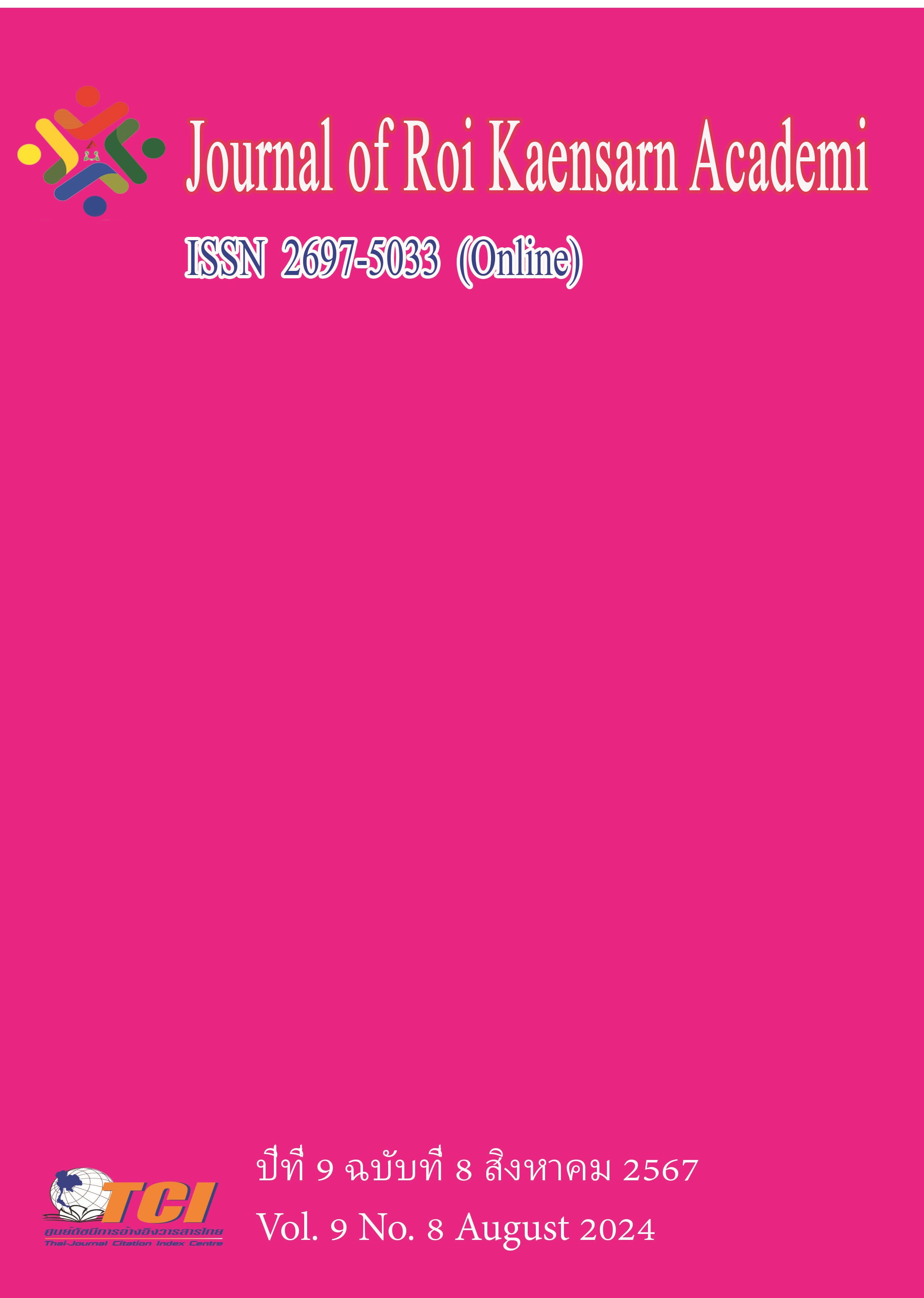The Development of Guangxi Intangible Cultural Heritage Curriculum Based on Schwab Practical Curriculum Theory to Enhance The College Students’ Conservative Mind
Main Article Content
บทคัดย่อ
The objectives of this research were: 1) to investigate the current situation and effectiveness of the intangible cultural heritage curriculum and students’ conservative mind,2) to develop Guangxi intangible cultural heritage curriculum based on Schwab’s practical curriculum theory to enhance the college students’ conservative mind,3) to assess the efficiency of Guangxi intangible cultural heritage curriculum based on Schwab’s practical curriculum theory through comparing the college students ’conservative mind before and after the implementation of curriculum. The research tools were: 1) the Guangxi intangible cultural heritage conservative mind Questionnaire for college students, 2) the Guangxi Intangible Cultural Heritage Curriculum lesson plan, 3) pre-test and post-survey Scale of the Conservative Mind of college Students. Research data were collected and analyzed by percentage, mean, standard deviation, t-test for dependent sample.
The results of this study were as follows: 1) college students' conservative mind is at high level(=4.12), in the three dimensions of conservative mind,“Attitudes towards the safeguarding of Guangxi intangible cultural heritage”was at the lowest rank , ,2) Based on Schwab’s practical curriculum theory, 30 lessons of Guangxi intangible cultural heritage curriculum in class hours are developed,3) After taking part in the 30 lessons course, the conservative mind of the students was significantly improved (t=28.13,Sig.=000). At the same time, the three dimensions of conservative mind including knowledge, attitudes, acts have been improved.
Article Details
เอกสารอ้างอิง
Chen, L., & Hu, H. (2019). The enlightenment of Schwab's practice-oriented curriculum theory to the development of school-based curriculum in China. Journal of Chengdu Normal University. 09, 28-33.
Cui, xinling, Liang , J., & Wang, J. (2018). Joseph Schwab’s Practical Curriculum Theory and Enlightenment. Educational Practice and Research. 09, 4–7.
Daming, H., Intarasompun, W., Watananimitgul, W., & Iamsa-ard, A. (2023). The development of environmental education curriculum based on community participation to promote senior high school students’ environmental conservative mind. Journal of Roi Kaensarn Academi. 8(12), 405–419. https://so02.tci-thaijo.org/index.php/JRKSA/article/view/266494
Fan, B. (2019). Local ethnic group based on Mongolian intangible cultural heritage inheritance: Research on the construction of cultural curriculum. National Folklore. 68-69.
Li , X., Li, wanying, & Li , J. (2014). Schwab Practical Curriculum Paradigm Enlightenment to the Practical Teaching of Ideological and Theoretical Courses in Universities. Journal of Social Science of Harbin Normal University. 01, 192–195.
Huang, wei , & bi , C. (2021). Preparation of a Simple General Cultural Identity Questionnaire. Advances in Psychology. 11, 620–626.
Meng,C., Intarasompun,W.,Watananimitgul ,W., & Iamsa-ard, A. (2023). The Development of Issue-centered Teaching Model based on Radical Constructivism Theory to Improve Students’ Critical Thinking Ability. Journal of Roi Kaensarn Academi. 8 (11), 156–170. Retrieved from https://so02.tci-thaijo.org/index.php/JRKSA/article/view/266117
Peihao, X., Intarasompun, W., Watananimitgul, W., & Iamsa-ard, A. (2023). The development of life values integrated curriculum to enhance mental health for freshmen students. Journal of Roi Kaensarn Academi. 8 (11), 131–146. https://so02.tci-thaijo. org/index.php/JRKSA/article/view/266122
Shi , X., & xu , L. (2005). A Review of Schwab’s Curriculum Theory. Studies in Foreign Education. 01, 68–70.
Wang, F., & Xu, J. (2019). College students' cognition of intangible cultural heritage and its inheritance and protection path. Education and Teaching Forum. 41, 117-119.
Wang, J. (2009). Local colleges and universities offer courses on local intangible cultural heritage. Journal of Xinxiang University (Social Science Edition). 23, 169-171.
Wang, J. (2010). Schwab's "practical curriculum" theory on vocational education in China: Enlightenment and reference of curriculum reform. Vocational Education Communication. 05, 18-21.
Wang, J. (2022). Investigation on the status of intangible cultural heritage of college students in Guizhou. Chinese National Expo. 118-120.
Wang, Y. (2019). Research on the construction of the curriculum system of intangible cultural heritage in colleges and universities. Educational Observation. 2019(08), 66-67.
Wang, Z. (2016). Classroom narration and ethnographic analysis of intangible cultural heritage in hometown: Application of "Experiential Teaching Model" in folklore courses. Journal of Kaili University. 34 (4), 160-163.
Shang, X., Teng, H., & Zhang, H. (2018). An analysis of college students' awareness of dematerialized heritage protection in Liaoning Province. Liaoning Silk, 41-42.
Xiang Hui, J., Intarasompun, W., Watananimitgul, W., & Iamsa-ard, A. (2023). The development of psychological health education curriculum based on psychological capital to improve the positive psychological quality of college students. Journal of Roi Kaensarn Academi. 8 (11), 171–185. https://so02.tci-thaijo.org/index.php/ JRKSA/article/view/266118
Xiao, J. (2018). Discussion on the curriculum construction of intangible cultural heritage in colleges and universities. Think Tank Age. 02, 257-258.
Xie, F. (2018). The construction of intangible cultural heritage curriculum in colleges and universities based on organic curriculum view. Educational Criticism. 03, 24-28.
Xu, H. (2015). Exploration on the course system and teaching mode of Guangxi dematerialized heritage art. Teaching Forum. 06, 70-71.
Yanting, C., Intarasompun, W., Watananimitgul, W., & Iamsa-ard, A. (2023). The development of the mental health education curriculum based on Kolb’s experiential learning theory to improve ethnic preparatory students’ learning adaptability. Journal of Roi Kaensarn Academi. 8(12), 241–256. https://so02.tci-thaijo.org/index.php/JRKSA/article/ view/266490
Yuan, L., & Yang, Y. (2020). Schwab's concept of "practice" and curriculum purport. Global Education Outlook, 17-25.
Zhonghua, G.., Intarasompun, W.., Watananimitgul , W., & Iamsa-ard, A. (2023). The Development of Blended Teaching model Based on Deep Learning Theory to Enhance college students’ critical thinking. Journal of Roi Kaensarn Academi. 8 (11), 381–394.
Retrieved from https://so02.tci-thaijo.org/index.php/JRKSA/article/view/266121
Zimin , Z., Watannanimtgul , W. ., Intarasompun , W. ., & Iamsa-ard , A. . (2023). The Development of Instructional Model According to Immersive Learning in Virtual Reality Environment to Enhance Tour Guide Students’ Oral Communication Ability . Journal of Roi Kaensarn Academi. 8 (12), 324–338. Retrieved from https://so02.tci-thaijo.org/index.php/JRKSA/article/view/266491

